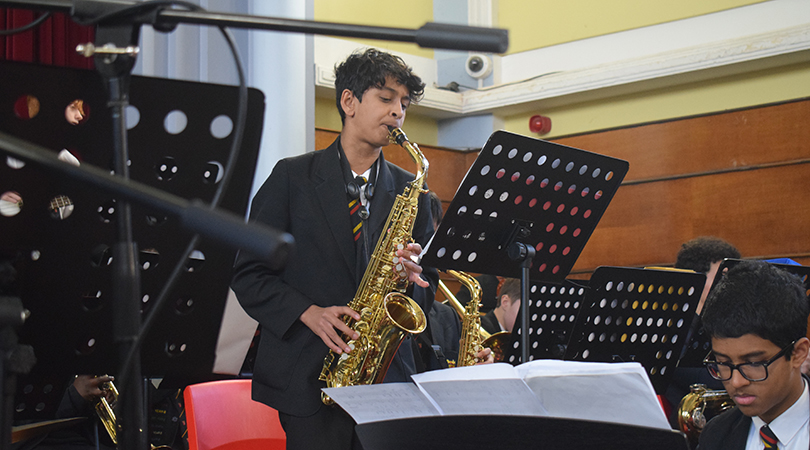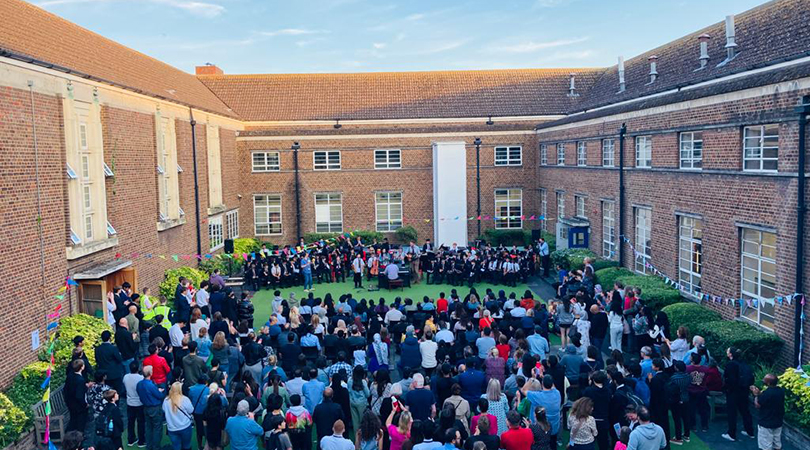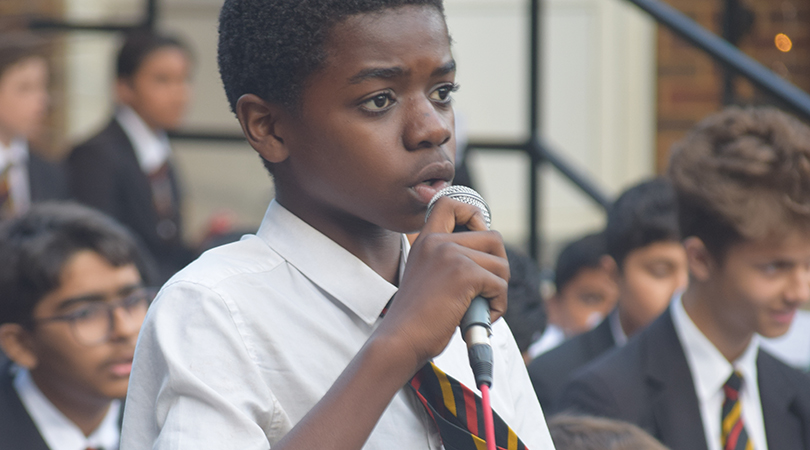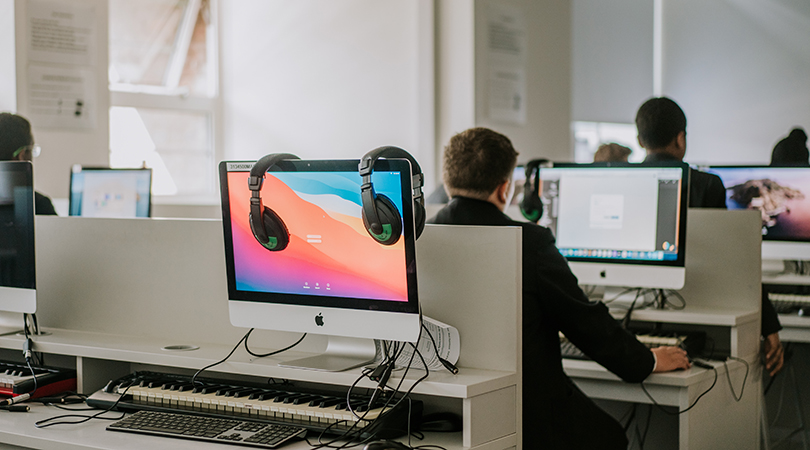At Key Stage 3, students explore a host of musical genres and styles practically through performance, composition, listening and appraising. Students use their voice, percussion instruments, keyboards, music technology and their own instrumental disciplines to succeed and develop as musicians.
Year 7
Curriculum
Pulse & Rhythm
This unit introduces pupils’ awareness to the importance of pulse and rhythm as a fundamental upon which music is built and performed.
Voiceworks
This unit develops pupils’ ability to explore the voice through singing a wide range of different types and styles of songs, developing their ability to sing music in two (or more) parts.
Keyboard Skills
Students develop their keyboard skills and learn to read and write musical notation.
Introduction to Sequencing
All students will develop skills and an understanding of music production using Logic Pro X software.
British Folk Music
Students study and perform traditional music from the British Isles and explore how it has influenced modern music.
Pentatonic Composition
All students explore the pentatonic scale and compose original pieces in a number of styles.
Assessment
Pulse & Rhythm
Composition and listening assessment using classroom instruments and music technology.
Voiceworks
Practical assessment in singing with a range of listening and appraising tasks.
Keyboard Skills
A range of keyboard performance and composition challenges to rehearse and showcase.
Introduction to Sequencing
Students are assessed through a series of music production activities in addition to a key terms assessment.
British Folk Music
Practical assessments using voice and guitars. Summative key terms assessment.
Pentatonic Composition
Students are assessed on their progression throughout several lessons on keyboards and tuned percussion.
Progress & Preparation Activities (PPA)
PPA will be communicated with students via PARS / INSIGHT and will be hosted on their Teams music classroom.
Further Resources

The school has a subscription to The Day, an online news service for schools. Click the button to the right, then browse ‘Subjects’ in the top menu to find music resources.
Please see below for a number of resources to maximise students’ progress during their Year 8 curriculum.
- MusicTheory.net – a useful website that will help with music theory
- BBC Bitesize: KS3 Music – an informative website with information on music-making as well as the language of theory of music.
- 8Notes -free sheet music and lessons.
- NyphilKids.org – a fun and informative website about the orchestra with quizzes and games.
Year 8
Curriculum
Space Music
Students explore chromaticism and timbres used to create atmospheric music.
Melody & Ostinato
Focuses on how composers combined ranges and patterns of notes to create an intended outcome.
Blues
Explores the history of blues and its influence on today’s music.
All About the Bass
Students explore the bass clef, bass line patterns, riffs and walking bass patterns.
Riffs and Rock Music
Explores how riffs are created and their influence on creating popular music from the 1960s onwards.
Film Music
Introduces students to the musical devices used in film music with a particular focus on leitmotifs.
Assessment
Space Music
Students will be assessed on a number of short compositions which feature chromaticism, elements and suitable timbres.
Melody & Ostinato
Performance and composition assessments using voice, classroom instruments and music technology.
Blues
Practical assessments using voice / guitars. Pupils also compose their own Blues song. End of unit key terms assessment.
All About the Bass
Practical challenges using double bass, bass guitar , guitar and keyboard. Summative key terms assessment.
Film Music
Practical assessments – performances and short compositions with film music characteristics.
Progress & Preparation Activities (PPA)
PPA will be communicated with students via PARS / INSIGHT and will be hosted on their Teams music classroom.
Further Resources

The school has a subscription to The Day, an online news service for schools. Click the button to the right, then browse ‘Subjects’ in the top menu to find music resources.
Please see below for a number of resources to maximise students’ progress during their Year 8 curriculum.
- MusicTheory.net – a useful website that will help with music theory
- BBC Bitesize: KS3 Music – an informative website with information on music-making as well as the language of theory of music.
- 8Notes -free sheet music and lessons.
- ClassicsforKids.com – a creative website where students can compose their own music without any additional software at home.
Year 9
Curriculum
4 Chords
This unit develops students understanding and application of chords. We also explore a GCSE set work by Queen.
Video Game Music
Students explore character and ground themes as well as sound effects I computer and video game soundtracks.
African Drumming
This unit develops students’ understanding of polyrhythmic music and African drumming techniques and conventions.
The Popular Song
Students explore approaches to popular song-writing forms including stylistic features, harmony and music technology techniques.
Songwriting
Students explore songwriting and lyric writing to prepare them for GCSE Music set work study.
Song Production
Students produce a high-quality composition demonstrating their progress in the art of songwriting and music production.
Assessment
4 Chords
Listening and Appraising tasks with a range of composition challenges. End of unit key terms assessment.
Video Game Music
Composition and performance assessments using Logic Pro X. Listening activities as well as an end of unit key terms assessment.
African Drumming
Practical ensemble and small group assessments, with group composition challenges.
The Popular Song
Practical assessments using GCSE assessment criteria for solo and ensemble performance skills.
Songwriting
Songwriting tasks with a range of composition challenges. End of unit key terms assessment.
Song Production
Composition and arrangement challenges with some listening assessments. End of unit key terms assessment.
Progress & Preparation Activities (PPA)
PPA is set on Insight / Parent Portal by class teachers generally on a weekly basis.
Further Resources

The school has a subscription to The Day, an online news service for schools. Click the button to the right, then browse ‘Subjects’ in the top menu to find music resources.
Please see below for a number of resources to maximise students’ progress during their Year 9 curriculum.
- MusicTheory.net – a useful website that will help with music theory
- BBC Bitesize: KS3 Music – an informative website with information on different musical styles and well known composers.
- Incredibox – a website that helps students understand some compositional techniques.





